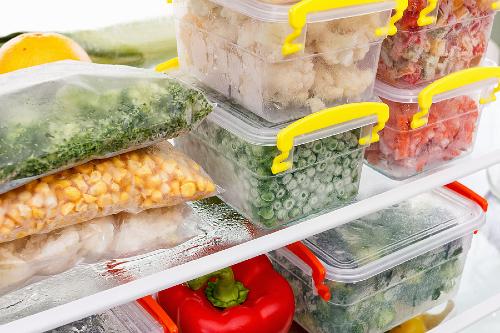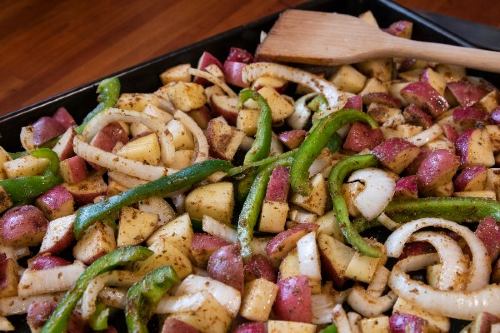Sometimes planning meals seems like it can take up more time than it’s worth (especially when you’re busy) but planning meals ahead can end up saving you a lot of time in the long run.
Why should I plan my meals?
A busy day can become much less stressful when you realize you have a healthy, tasty meal waiting for you. Here are some great reasons why you should plan meals:
- Less stress. Planning meals ahead of time can be a great way to save time and reduce stress. You won’t have to worry about what you’re making for dinner or what you need to buy because it will already be done!
- Save money. Planning your meals is more budget-friendly because you’re less likely to grab take-out if you have food prepared at home. You can also build your meal plan for the week around discounts and coupons. And did you know that many farmer’s markets double SNAP benefits? [1] To find a list of farmer’s markets in your area where you can stretch your buying power to purchase fresh produce, click here.
- Healthier choices. You’re more likely to make good food choices ahead of time than when you are in a rush to get dinner on the table. When planning ahead, you can consider healthy options and incorporate them into your meals. To learn more about making healthy food choices for you and your family, visit foodtalk.org for online nutrition education opportunities!
- Family time. When meals are prepared ahead of time, you have more time to enjoy eating with your family. Eating together as a family has many benefits of its own including connecting with your family and increasing your children’s vocabulary. Our Mealtime Questions for a Mindful Meal blog is a great place to get conversation starters for your next family meal!
- Less food waste. When you have a plan to use every food you bought, ingredients won’t go bad and get thrown out as often. For example: if you decide ahead of time that you’ll try a new fruit or veggie with a meal, you will be more likely to actually eat it.

How can I become a meal planning pro?
Maybe meal planning might seem like a great idea to you, but it hasn’t worked out well in the past. Or maybe you’ve been wanting to try your hand at it, but the process seems too intimidating. Either way, planning your meals can be a breeze if you have the right tools and knowledge.
Here are some tips for making meal planning easier, so you can make the most of your time:
Designate a planning day.
- Spend 30 minutes or an hour planning all the meals for a week, or however long you want. Setting aside time to focus on meal planning can help you make better food choices.
- Check out this blog for some important questions to consider when planning like allergies, family preferences, and available cooking equipment.
Choose your go-to meals.
- Write down all the ingredients in those meals. Later, when you’re choosing meals, it will be easy to see what you need. Plus, you know with these favorite meals or tried and true favorites your family will like whatever you’ve planned.
Write everything down.
- Go through all the meals for the week and write down all the ingredients you’ll need from the store.
- Add everything to a grocery list, so you won’t have to make a second trip to the store for forgotten ingredients.
Consider coupons and deals.
- Many grocery stores have weekly coupons. Take advantage of them by incorporating foods with discounts into your weekly meal plan.
- When purchasing fresh produce, keep in mind that foods are less expensive when they are in season. For a list of fresh fruits and vegetables and when they are in season in Georgia, click here!
Take inventory at home.
- Look through all the ingredients you already have before you go buy more at the store! This will help reduce food waste.
Choose a shopping day.
- This can be the same day as your planning day – or not! Set aside time when you can go to the store to get everything on your grocery list. Once you are done with the trip, you won’t have to go back for another week.

If you find yourself still struggling to get the hang of meal prepping, try out these additional pointers:
Keep a meal journal.
- Write down meals and recipes that went well for you and your family so you can remember to make them again.
Don’t forget breakfast, lunch, and snacks.
- Family dinners aren’t the only meal for which you can plan ahead. Planning for all meals is a great way to keep mealtime organized and efficient, especially with big families! For some quick, go-to breakfast ideas, check our blog titled Balanced Breakfasts for Kids. You can even plan out your snacks, too!
Stock up on non-perishables.
- Some foods can stay in the pantry or freezer for a long time before going bad. When you see foods like this on sale, make sure to stock up! Click here for a list of common, shelf-stable items to keep on hand.
Do prep work.
- Prepping food when you have time makes cooking much easier when you’re in a hurry. Prepped foods like chopped vegetables or sliced melon can stay in the refrigerator for a couple of days before they need to be used in a recipe.
Plan for leftovers.
- If you know you are going to make more food than you will need, you can plan to eat leftovers the next day. Just make sure to safely store the leftover food!

Get Creative!
Meal planning is a great way to try out new recipes. A good place to start is by coming up with 10 or more go-to meals that you know will work for you and your family. If you can’t think of 10, you might want to try some new recipes. Don’t worry- we’ve got your covered! Here are some of our favorite breakfast, lunch, and dinner recipes that can be easily prepped and stored ahead of time:
- Banana Pudding Overnight Oats
- Very Blueberry Buttermilk Muffins
- Festive Tuna Salad
- Slow-Cooker Vegetarian Lasagna
- Sheet Pan Red Potatoes and Peppers
- Chicken Chili with White Beans

No one starts out as a meal planning professional! It takes practice. Hopefully, this blog has given you some ideas of the best way that you can tackle planning for yourself and your family.
Written by Sarah Stotz, Ph.D., RDN, LD, and Darci Bell, RDN, LD | Reviewed by Leslie Davis, MS, RD, LD, CDCES, and the Nutrition Education Team
Posted on: August 2, 2021